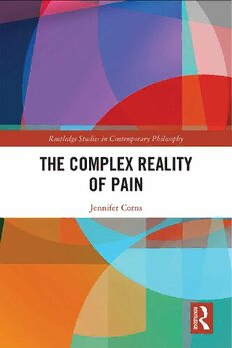
The Complex Reality of Pain PDF
Preview The Complex Reality of Pain
THE COMPLEX REALITY OF PAIN Jennifer Corns The Complex Reality of Pain This book employs contemporary philosophy, scientific research, and clinical reports to argue that pain, though real, is not an appropriate object of scientific generalisations or an appropriate target for medical intervention. Each pain experience is instead complex and idiosyncratic in a way which undermines scientific utility. In addition to contributing novel arguments and developing a novel position on the nature of pain, the book provides an interdisciplinary overview of dominant models of pain. The author lays the needed groundwork for improved models and targeted treatments at a time when pain science, pain medicine, and philosophy are explicitly searching for both and failing to find them. The Complex Reality of Pain will be of interest to a broad range of re- searchers and students, including those working in philosophy of mind, philosophy of science, cognitive science, neuroscience, medicine, health, cognitive and behavioural psychology, and pain science. Jennifer Corns is Lecturer in Philosophy at the University of Glasgow, UK. Her research focuses on pain, affect, suffering, and death. She is the editor of The Routledge Handbook of Philosophy of Pain (Routledge, 2017), and co-editor of Philosophy of Pain: Unpleasantness, Emotion, and Deviance (Routledge, 2018) and Philosophy of Suffering: Meta- physics, Value, and Normativity (Routledge, forthcoming). Routledge Studies in Contemporary Philosophy 126 Responses to Naturalism Critical Perspectives from Idealism and Pragmatism Edited by Paul Giladi 127 Digital Hermeneutics Philosophical Investigations in New Media and Technologies Alberto Romele 128 Naturalism, Human Flourishing, and Asian Philosophy Owen Flanagan and Beyond Edited by Bongrae Seok 129 Philosophy of Logical Systems Jaroslav Peregrin 130 Consequences of Reference Failure Michael McKinsey 131 How Propaganda Became Public Relations Foucault and the Corporate Government of the Public Cory Wimberly 132 Philosophical Perspectives on Contemporary Ireland Edited by Clara Fischer and Áine Mahon 133 Inference and Consciousness Edited by Anders Nes with Timothy Chan 134 The Complex Reality of Pain Jennifer Corns For more information about this series, please visit: https://www.routledge. com/Routledge-Studies-in-Contemporary-Philosophy/book-series/SE0720 The Complex Reality of Pain Jennifer Corns First published 2020 by Routledge 52 Vanderbilt Avenue, New York, NY 10017 and by Routledge 2 Park Square, Milton Park, Abingdon, Oxon OX14 4RN Routledge is an imprint of the Taylor & Francis Group, an informa business © 2020 Taylor & Francis The right of Jennifer Corns to be identified as author of this work has been asserted by her in accordance with sections 77 and 78 of the Copyright, Designs and Patents Act 1988. All rights reserved. No part of this book may be reprinted or reproduced or utilised in any form or by any electronic, mechanical, or other means, now known or hereafter invented, including photocopying and recording, or in any information storage or retrieval system, without permission in writing from the publishers. Trademark notice: Product or corporate names may be trademarks or registered trademarks, and are used only for identification and explanation without intent to infringe. Library of Congress Cataloging-in-Publication Data A catalog record for this title has been requested ISBN: 978-0-367-35369-8 (hbk) ISBN: 978-0-429-34298-1 (ebk) Typeset in Sabon by codeMantra For Himma, to whom it was long promised. The most compelling challenge of pain is to help the patient who is suffering pain. —Melzack and Wall, The Challenge of Pain, 1988 Contents Preface ix 1 Introduction: Pain in Life, Science, and Medicine 1 2 The Need for Complexity: Rejecting the Orthodoxy of Simplicity 30 3 Mechanistic Explanations: How Complex Idiosyncrasy Undermines Them 84 4 Adopting Scientific Eliminativism: How Complex Idiosyncrasy Undermines Scientific Utility 141 5 Rejecting Traditional Eliminativism: Why Pain Is Still Real 174 6 Conclusion: Living with the Complex Reality of Pain 199 Index 215 Preface While treatment interventions in response to pain reports have advanced considerably, my interest in pain was first engendered by my personal acquaintance with its limitations. My father suffers migraine headaches for which there is no clear explanation and no relief beyond that of- fered by strong narcotics—highly addictive, desperate interventions only sometimes knock out the migraine while reliably affecting wide swaths of other functioning. Twenty years ago, my mother was diagnosed with the fibromyalgia that she simply continues to manage. As a teenager, I had raging cluster headaches: blinding pain that would come without warning and leave me writhing in screaming agony. After tests which re- vealed no explanatory abnormalities, they eventually simply went away. In my life, as in most, pain has first and foremost been a practical problem. It was only in graduate school for philosophy that I began to real- ise that pain was also a theoretical problem. In particular, I became hooked intellectually through the tales of pain dissociation, as presented in Nikola Grahek’s classic Feeling in Pain and Being in Pain. What could pains be, I began to wonder, such that they included things as dramat- ically different as those associated with my raging headaches and those calmly reported by pain asymbolics? What, come to think of it, could pains be such that after centuries of study we still can’t find them (or their correlates) anywhere in the body? What could they be such that, unlike any other recognised medical problem, their only accepted valid marker for treatment was a person reporting it? The theoretical and practical problems of pain are not independent. They must be solved together. This shouldn’t be surprising. What may be surprising is that the tools of philosophy are well-suited to helping solve them. Over coffee at an interdisciplinary conference last year, a leader in the philosophy of pain asked me, “Why do you focus on treatment? Surely that’s a whole other set of problems”. Rather taken aback, I found it difficult to know how to answer. Confused, I responded, “But don’t you
